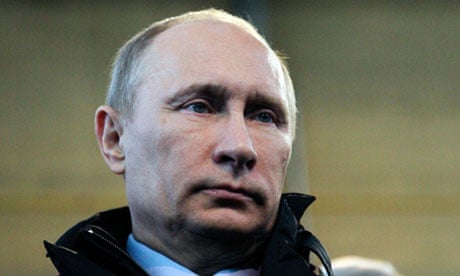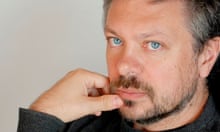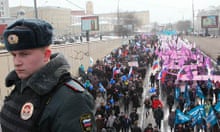Targeted arrests, propaganda films, increased fines – nothing has yet brought an end to corruption in Russia. Now, the Kremlin is seeking to ban officials from using certain examples of apparently corruption-inducing language in its bid to overcome the endless scourge.
"Thank you doesn't butter my bread," "What are we going to do?" and "The question is difficult to solve, but possible" are among those terms that the ministry of labour and social security has recommended banning in a document published this week.
Other terms include: "You need a weightier argument," and the ubiquitous "dogovorimsya", which translates roughly as: "We'll sort it out."
The document also advises officials to avoid certain subjects when dealing with the public, including their low wages, relatives' unemployment and "the desire to acquire this or that property, receive this or that service, go on a tourist tour".
Corruption is a centuries-old problem in Russia, ingrained in its culture and its language. Nineteenth-century writers such as Nikolai Gogol poked fun at the problem with dark humour.
It continued in Soviet times, when Russians were expected to brings gifts – alcohol, chocolate, flowers – to everyone from doctors to teachers.
Under Vladimir Putin, corruption has grown to astronomical heights, infecting every aspect of life and growing ever more expensive for average Russians, who are expected to pay thousands of pounds in bribes to everyone from traffic police to tax officials. Government critics have highlighted corruption scandals reaching Putin's inner circle, and the president himself.
Russia ranked 133 out of 174 on Transparency International's corruption perceptions index last year – putting it well below the other emerging markets countries with which it hopes to compete.
Putin has devoted dozens of speeches to rooting out corruption. He has never addressed corruption accusations levelled against him, including the alleged existence of a lavish hidden palace on the Black Sea.
Critics have approached a recent Kremlin anti-corruption campaign with suspicion. Several MPs have resigned in recent weeks after it emerged that they owned property abroad. Putin has signalled his approval for a draft law that would ban Russian officials from keeping their funds in foreign bank accounts.
The labour ministry document is addressed to officials of all levels.
It fails to list all of the common terms associated with corruption in Russia, missing out such gems as: "We need to add legs [money] to your document."



